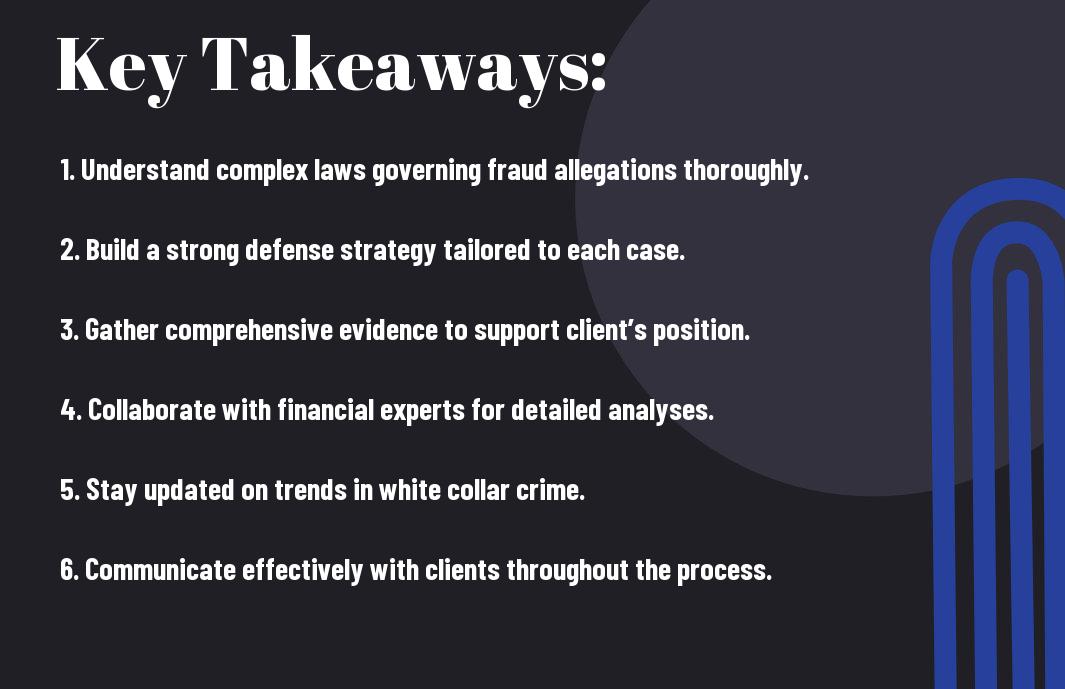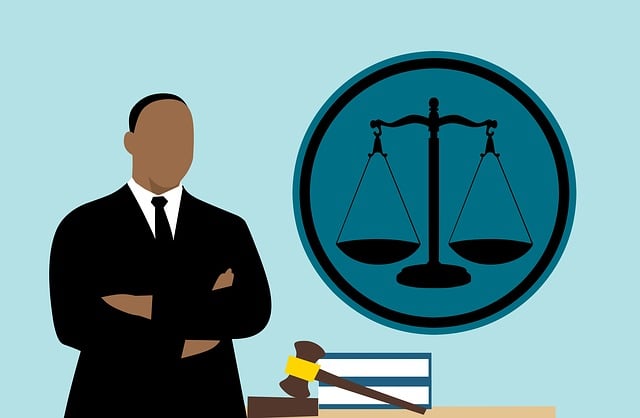There’s a complex web of regulations and laws surrounding fraud cases, and if you find yourself entangled in one, you’ll need expert guidance. A skilled Denver white collar attorney is necessary for deciphering the intricate legal requirements and potential penalties you face. They will develop a tailored strategy to protect your rights and advocate for your interests, helping you navigate everything from investigations to court proceedings. Understanding the nuances of fraud law can significantly impact the outcome of your case, so having an attorney by your side is vital for achieving the best results.
Key Takeaways:
- Navigating fraud cases requires a deep understanding of both state and federal laws, as the legal landscape can vary significantly.
- Effective representation involves thorough investigation and evidence collection to build a strong defense strategy.
- Emphasizing communication with clients is imperative to ensure they understand the legal process and potential outcomes.
- Staying current on legal precedents and trends in fraud cases can enhance an attorney’s ability to predict outcomes and tailor their approach.
- Collaboration with financial experts and forensic accountants can provide valuable insights and strengthen a defense case against fraud allegations.
Understanding White Collar Crime
Your understanding of white collar crime is vital for navigating its complexities. These crimes are non-violent and often involve deceit for financial gain. Recognizing the nuances can aid in effectively addressing and defending against such cases.
Definition and Types of Fraud
By understanding fraud, you can identify its various forms. Fraud is a deceptive practice aimed at securing unfair or unlawful gain.
| Type of Fraud | Description |
| Securities Fraud | Deceptive practices in trading financial securities. |
| Insurance Fraud | Submitting false claims to insurance companies. |
| Credit Card Fraud | Unauthorized use of credit cards for purchases. |
| Wire Fraud | Using electronic communications to commit fraud. |
The awareness of these types can assist in recognizing fraudulent activities.
Common White Collar Offenses in Denver
On your journey in understanding white collar crime in Denver, it’s vital to be familiar with prevalent offenses. Much of the white collar crime involves trust and exploits the system’s vulnerabilities.
Common white collar offenses include money laundering, fraud, and embezzlement. Each of these crimes carries severe legal consequences that could significantly impact your future. The ramifications of being involved in such offenses can include significant financial penalties and even prison time. If you find yourself facing allegations of white collar crime, seeking a knowledgeable attorney can be paramount in navigating these complex legal waters.

The Role of a Denver White Collar Attorney
Clearly, a Denver white collar attorney plays an indispensable role in guiding clients through the complexities of fraud cases. They leverage their legal expertise to ensure that your rights are protected while developing strategies tailored to your unique situation. A qualified attorney can demystify the legal jargon, reduce your stress, and provide important support throughout the process.
Legal Expertise and Specialization
Role of a white collar attorney is to harness their extensive legal knowledge to navigate the complex landscape of financial and corporate crimes. They are adept in areas such as fraud, embezzlement, and insider trading, enabling them to provide focused and effective representation. Your attorney’s specialization equips them to not only defend you against allegations but also to anticipate potential challenges.
Importance of Local Knowledge
For anyone facing fraud charges in Denver, having local knowledge is invaluable. An understanding of the local legal landscape allows your attorney to navigate the system more effectively, helping you to avoid potential pitfalls that could jeopardize your case.
It is imperative that your Denver white collar attorney possesses deep insights into local laws and regulations, as well as a robust network of relationships within the legal community. This local knowledge enables them to anticipate the nuances of courts and judges in the area, which can be a determining factor in the outcome of your case. Moreover, their familiarity with local investigators and prosecutors can enhance your defense strategy, providing you with a significant advantage during negotiations and trials. In essence, this localized expertise can be instrumental in safeguarding your rights and ensuring a fair process.

Navigating the Legal Framework
Despite the complexity of fraud cases, understanding the legal framework can be your key to a successful defense. By familiarizing yourself with relevant laws, regulations, and procedural requirements, you can effectively navigate this intricate landscape, ensuring you’re equipped to handle each step of the process.
Relevant Laws and Regulations
Behind the nuances of fraud cases lie numerous state and federal laws that govern these offenses. Familiarizing yourself with these legal principles, such as the Wire Fraud Act and Securities Fraud Statute, is important to effectively strategize your defense and mitigate potential consequences.
Understanding Criminal and Civil Charges
Between criminal and civil charges, distinct implications exist that you need to comprehend to safeguard your interests. Criminal charges may result in hefty penalties, including jail time, while civil cases could lead to substantial financial liabilities.
Further, navigating the differences is vital as criminal charges can bring about severe repercussions, affecting your freedom and reputation, while civil suits can involve monetary damages or injunctions. Understanding these distinctions allows you to build a more effective defense strategy and anticipate the range of outcomes that might arise in your situation.

Investigation and Evidence Gathering
Not every attorney is equipped to handle the complex world of fraud cases. As a Denver white collar attorney, navigating investigations requires you to develop a thorough understanding of the methods employed by prosecutors and the type of evidence they may seek. Establishing a solid strategy for gathering, organizing, and analyzing evidence will be crucial in defending your client effectively.
Collaborating with Financial Experts
Before venturing into complex fraud cases, it is crucial to collaborate with financial experts who can help untangle the intricate details of financial transactions. Partnering with forensic accountants or financial analysts enables you to better understand the evidence and develop a comprehensive defense strategy that speaks to the nuances of the case.
Preserving Client Rights During Investigations
One of your primary responsibilities during an investigation is to safeguard your client’s rights. You must ensure that their interests are protected while navigating the legal system, which often involves cooperating with law enforcement and other entities.
A vital part of preserving your client’s rights during investigations is to be attentive to legal protocols and constitutional protections. This includes ensuring that search warrants are valid, interrogation rights are maintained, and any evidence gathered is admissible in court. Your proactive measures can have a significant influence on the outcome of the case and will help in mitigating the risks involved. By actively engaging with your client and informing them of their rights, you empower them during this challenging process.
Defense Strategies in Fraud Cases
For individuals facing fraud charges in Denver, a robust defense strategy is necessary. Your attorney will carefully analyze the evidence against you, leveraging legal knowledge and experience to build a case that can either challenge the prosecution’s claims or negotiate favorable outcomes. Understanding the nuances of fraud law is invaluable, allowing your attorney to explore all avenues of defense to protect your rights and interests.
Common Defense Tactics
On many occasions, defense attorneys employ various tactics to counter fraud allegations. This may include demonstrating lack of intent to commit fraud, highlighting insufficient evidence, or revealing procedural errors during the investigation. Such strategies aim to sow doubt in the prosecution’s case and can lead to reduced charges or outright dismissal.
Mitigating Consequences
Consequences of a fraud conviction can be severe and far-reaching. However, there are opportunities to mitigate these penalties through strategic legal maneuvering. Your attorney can advocate for alternative sentencing options, such as probation or rehabilitation programs, which may lessen the impact of a conviction on your personal and professional life.
Even if convicted, you can explore various strategies to mitigate the consequences of a fraud charge. Seeking the assistance of your attorney may lead to plea bargains that minimize jail time or restoration efforts that restore your professional credibility. By demonstrating growth and remorse, you can enhance your chances of securing a less severe sentence, ultimately protecting your future opportunities and helping you rebuild your life after such a challenging situation.
The Importance of Client Communication
Unlike many other areas of law, effective communication in white-collar crime cases can significantly influence the outcome. A Denver white-collar attorney must prioritize transparent dialogue with clients to understand their concerns and build a solid defense strategy. This communication not only helps you feel more secure but also aids the attorney in tailoring their approach to your unique situation.
Establishing Trust and Transparency
Client trust is paramount in navigating complex fraud cases. By fostering an open atmosphere, you can share sensitive information without fear, allowing your attorney to craft a more effective defense strategy that accurately reflects your circumstances.
Keeping Clients Informed Throughout the Process
Keeping you informed about the developments in your case helps reinforce a strong attorney-client relationship. Regular updates make you feel engaged and empowered as your case progresses.
This ongoing communication ensures you are aware of any changes or updates affecting your situation. You deserve to know key developments, including any evidence, witness testimonies, or legal maneuvers. By keeping you in the loop, your attorney not only strengthens your trust but also allows you to prepare for potential outcomes. In white-collar cases, where stakes can be incredibly high, your understanding of every twist and turn is vital for formulating a proactive strategy to tackle challenges head-on.
Final Words
Hence, by enlisting the expertise of a Denver white collar attorney, you can effectively navigate the complexities of fraud cases. With their knowledge of legal procedures, investigative techniques, and negotiation strategies, your attorney will guide you through each stage of the process, ensuring your rights are protected. They can help you build a strong defense and negotiate settlements, ultimately leading to the best possible outcome for your situation. Partnering with a seasoned attorney is an invaluable step in managing the challenges of your case.
FAQ
Q: What steps does a Denver white collar attorney take to evaluate a fraud case?
A: A Denver white collar attorney begins by thoroughly reviewing the details of the case, including any evidence or documentation available. They will assess the nature of the allegations, interview involved parties, and gather all relevant facts. This may involve looking into financial records, communications, and any legal precedents that could apply. By understanding the specifics of the case, the attorney can develop a strategic approach to defend their client effectively.
Q: How does a white collar attorney build a defense strategy for fraud charges?
A: To build a defense strategy, a white collar attorney will first identify potential weaknesses in the prosecution’s case. This could include challenging the adequacy of evidence or questioning the intent behind the actions in question. They may also look for mitigating factors, such as lack of knowledge or legitimate business practices, to present a well-rounded defense. Additionally, preparing witnesses and crafting persuasive arguments are necessary components of their strategy.
Q: What role does negotiation play in fraud cases handled by a Denver white collar attorney?
A: Negotiation can be a significant aspect of handling fraud cases. A Denver white collar attorney often engages in discussions with prosecutors to seek plea bargains or reduced charges. They may propose alternatives to prosecution, such as restitution agreements, which can help mitigate consequences for their client. Effective negotiation skills can lead to favorable outcomes without the need for a lengthy trial.
Q: What should someone expect during the legal process of a fraud case in Denver?
A: Individuals involved in a fraud case can expect a multi-step legal process. Initially, there may be an investigation period, followed by arraignment where formal charges are presented. The case could then move through pretrial motions, followed by a trial if a resolution isn’t reached. Throughout this process, having a knowledgeable attorney is vital as they will guide their client, explaining each phase and representing their interests in court.
Q: How can a Denver white collar attorney assist in protecting a client’s reputation during a fraud case?
A: Protecting a client’s reputation is a priority for a Denver white collar attorney. They may employ various strategies to minimize public exposure to negative press, which includes managing communication with the media and advising on public statements. By working to present their client in a positive light and minimizing damaging information from becoming public, the attorney helps maintain credibility and reputation throughout the legal proceedings.














